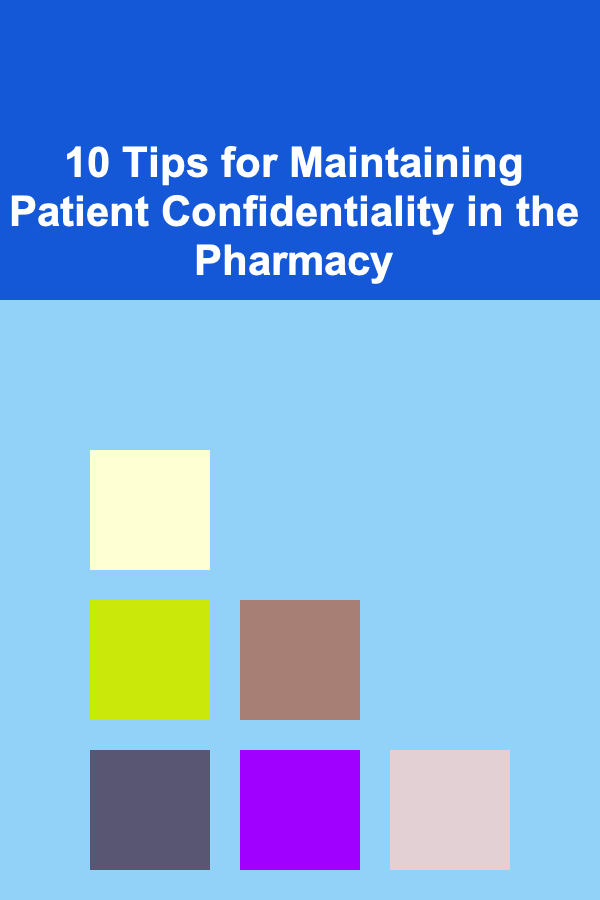
10 Tips for Maintaining Patient Confidentiality in the Pharmacy
ebook include PDF & Audio bundle (Micro Guide)
$12.99$5.99
Limited Time Offer! Order within the next:

In the modern healthcare environment, maintaining patient confidentiality is a fundamental responsibility of all healthcare professionals. For pharmacists, in particular, ensuring the privacy of patient information is not only an ethical obligation but also a legal one. With advancements in technology and the increasing reliance on digital health records, the challenges surrounding the protection of patient data have grown significantly. In the pharmacy setting, the protection of patient confidentiality is paramount because pharmacists have access to sensitive health information that must be safeguarded against unauthorized disclosure.
This article discusses ten essential tips for maintaining patient confidentiality in the pharmacy. These tips cover everything from understanding legal requirements to adopting best practices for securing physical and electronic patient data. By implementing these strategies, pharmacists can help ensure that patients' sensitive information remains protected.
Understand the Legal and Ethical Framework
Pharmacists must be well-versed in the legal and ethical requirements surrounding patient confidentiality. Various laws govern the handling of health information, including:
Health Insurance Portability and Accountability Act (HIPAA)
In the United States, the Health Insurance Portability and Accountability Act (HIPAA) provides comprehensive guidelines for safeguarding patient health information. Under HIPAA, pharmacists are required to protect the privacy and security of patient data and are held accountable for any breaches.
General Data Protection Regulation (GDPR)
In the European Union, the General Data Protection Regulation (GDPR) mandates strict data protection measures for patient information. Pharmacists in the EU must be familiar with GDPR guidelines, including obtaining patient consent for the use and sharing of their data and ensuring patients have the right to access and correct their personal information.
State and Local Laws
In addition to federal regulations, pharmacists must comply with local and state laws related to patient confidentiality. These laws may vary depending on jurisdiction and may offer additional protections or requirements for handling sensitive health information.
Pharmacists should participate in ongoing education and training to stay informed about the latest laws and regulations affecting patient confidentiality.
Implement Secure Electronic Systems
With the widespread use of electronic health records (EHRs) and digital prescription systems, maintaining patient confidentiality in the digital realm is essential. To protect patient data, pharmacies must invest in secure electronic systems and technologies that ensure the confidentiality, integrity, and availability of patient information.
Secure Access Controls
Pharmacies should implement access controls to ensure that only authorized personnel can access patient information. This can include the use of password-protected systems, multi-factor authentication, and role-based access controls that limit access based on job responsibilities.
Encryption of Patient Data
Encrypting patient data, both in transit and at rest, is a critical measure to ensure confidentiality. Encryption transforms data into an unreadable format that can only be deciphered by authorized parties. Pharmacists should ensure that all electronic records and communication methods comply with encryption standards to prevent unauthorized access.
Regular Audits
Pharmacies should regularly audit their electronic systems to ensure compliance with confidentiality policies and to identify any vulnerabilities. Regular audits help detect any unauthorized access attempts or breaches and provide an opportunity for corrective action.
Limit Access to Patient Information
One of the most important aspects of maintaining confidentiality is controlling who has access to patient information. Not every member of the pharmacy team needs access to every piece of patient data.
Principle of Least Privilege
The principle of least privilege dictates that individuals should only have access to the minimum amount of information required to perform their job functions. For example, a pharmacy technician may only need access to a patient's prescription history and should not have access to other sensitive health data.
Patient-Specific Access
When possible, pharmacies should implement patient-specific access controls that limit which individuals can view or handle sensitive patient information. For example, only the pharmacist directly overseeing a patient's medication therapy should have access to their comprehensive medication records.
Educate Pharmacy Staff About Confidentiality
Training and educating pharmacy staff on the importance of patient confidentiality are crucial for maintaining privacy. All pharmacy personnel, including pharmacists, pharmacy technicians, and support staff, should be trained on the ethical, legal, and practical aspects of confidentiality.
Ongoing Education
Pharmacy staff should participate in regular training sessions to stay updated on evolving laws, security practices, and confidentiality guidelines. Ongoing education ensures that staff members understand their responsibilities regarding patient privacy and are aware of potential consequences for violations.
Scenario-Based Training
Training should include practical, scenario-based exercises that help staff understand how to handle confidential information in real-world situations. For instance, staff should be trained on how to respond to patient inquiries, how to manage phone calls, and how to handle requests for information from third parties while ensuring patient confidentiality is maintained.
Secure Physical Access to Patient Information
In addition to securing electronic records, physical records and pharmacy areas must also be protected to ensure confidentiality. Unauthorized individuals should not have access to patient data stored in paper records or in areas where sensitive information may be inadvertently disclosed.
Locking Filing Cabinets
If your pharmacy stores patient information in physical form, it is essential to use locked filing cabinets or secure storage areas to keep documents safe. Only authorized personnel should have keys to these storage areas.
Restricted Access Areas
Areas where sensitive information is processed or stored, such as the pharmacy dispensing area or medication storage rooms, should be clearly marked and restricted to authorized personnel only. Physical barriers, such as locked doors or security systems, can help prevent unauthorized access.
Maintain Confidentiality During Patient Interactions
Pharmacists must be cautious about how they interact with patients to ensure confidentiality is maintained at all times. Verbal discussions and patient consultations can be a source of accidental disclosure if not properly managed.
Private Consultation Areas
Pharmacies should provide private consultation areas where pharmacists can discuss patient-specific information without fear of being overheard. These areas should be quiet, discreet, and free from distractions.
Avoid Public Discussions
Pharmacists should avoid discussing patient-specific information in public or open spaces. For example, conversations regarding a patient's medication or health history should not take place in areas where other customers can overhear.
Patient Identification
Before providing information to a patient or answering their questions, pharmacists should ensure that the individual requesting the information is the correct patient. This may involve verifying the patient's identity through a form of identification, such as a date of birth, prescription number, or a secure patient identification code.
Protect Information During Transfers
Whether transferring patient information between pharmacies, hospitals, or other healthcare providers, it is crucial to ensure that the transfer is done securely to maintain confidentiality.
Secure Communication Channels
When transferring patient information, ensure that secure communication channels, such as encrypted emails, secure file transfer protocols, or secure messaging systems, are used. Avoid sending sensitive patient data via unencrypted or unsecured methods, such as regular email or text messages.
Hand Delivery of Physical Records
If patient information needs to be transferred in physical form, it should be sealed in an envelope and hand-delivered, rather than left in a vulnerable or open location where unauthorized individuals might access it.
Dispose of Patient Information Properly
Improper disposal of patient information can result in unintentional breaches of confidentiality. Pharmacies must have clear protocols in place for securely disposing of both physical and electronic records.
Shredding Paper Records
Any paper documents containing patient information should be shredded before disposal to ensure that the information cannot be reconstructed or accessed by unauthorized individuals.
Secure Deletion of Electronic Data
When electronic records are no longer needed, they should be deleted securely. Standard file deletion methods are insufficient, as data may still be recoverable. Use data-wiping software or perform a secure wipe to ensure complete erasure of sensitive information.
Respond to Breaches Quickly and Effectively
Despite all precautions, breaches of patient confidentiality may still occur. When this happens, it is essential to respond quickly and effectively to mitigate the damage and ensure the breach does not continue.
Immediate Action
In the event of a breach, take immediate action to secure any exposed data, assess the scope of the breach, and determine its cause. If necessary, notify the appropriate authorities and patients affected by the breach.
Notify Affected Parties
As per HIPAA and other privacy regulations, patients must be notified if their information has been exposed. Notifications should include a description of the breach, what information was compromised, and the steps being taken to address the issue.
Review and Correct Procedures
After a breach, review the policies and procedures that allowed the breach to occur. Make any necessary adjustments or improvements to prevent future violations.
Foster a Culture of Confidentiality
Lastly, it is important to foster a culture of confidentiality within the pharmacy. This involves creating an environment where patient privacy is respected by all team members, from the pharmacist to support staff.
Leading by Example
Pharmacy leadership should lead by example and prioritize patient confidentiality in every aspect of pharmacy practice. By emphasizing the importance of confidentiality in everyday activities, you can encourage staff members to take responsibility for safeguarding patient information.
Encourage Reporting of Violations
Encourage an open culture where staff members feel comfortable reporting potential breaches or concerns related to patient confidentiality. Providing a non-punitive environment for reporting issues can help ensure that problems are addressed promptly and do not escalate.
Conclusion
Maintaining patient confidentiality in the pharmacy is a critical responsibility that protects both the patient and the healthcare provider. By adhering to legal requirements, implementing secure systems, educating staff, and following best practices for both physical and digital data security, pharmacists can ensure that patient information remains confidential. These ten tips provide a comprehensive approach to safeguarding sensitive patient data, helping pharmacies to build trust, comply with regulations, and ultimately contribute to better healthcare outcomes.
Reading More From Our Other Websites
- [Organization Tip 101] How to Use Hooks and Racks for Efficient Entryway Storage
- [Organization Tip 101] How to Teach Kids to Organize Their Fishing Gear
- [Trail Running Tip 101] The Healing Power of the Wild: Why Trail Running is the Ultimate Stress-Relief Outlet
- [Home Pet Care 101] How to Create a Safe and Comfortable Space for Your Pet at Home
- [Organization Tip 101] How to Create a Toy Library at Home
- [Organization Tip 101] How to Use Labels for Quick Identification of Gear
- [Home Holiday Decoration 101] How to Style Your Holiday Shelves with the Best Decorations
- [Personal Financial Planning 101] How to Plan for College Expenses Without Going Into Debt
- [Organization Tip 101] How to Incorporate Tech Gadgets for Better Organization
- [Home Storage Solution 101] How to Maximize Storage in Your Small Apartment

How to Keep Your Pet Safe During Seasonal Changes
Read More
How to Make Extra Money by Auditing Websites from Home
Read More
How to Make the Most of Limited Trunk Space
Read More
Why You Need a System for Managing Household Chores
Read More
How To Hydrate Mature Skin for Suppleness
Read More
How to Arrange Furniture for Flow and Function
Read MoreOther Products

How to Keep Your Pet Safe During Seasonal Changes
Read More
How to Make Extra Money by Auditing Websites from Home
Read More
How to Make the Most of Limited Trunk Space
Read More
Why You Need a System for Managing Household Chores
Read More
How To Hydrate Mature Skin for Suppleness
Read More